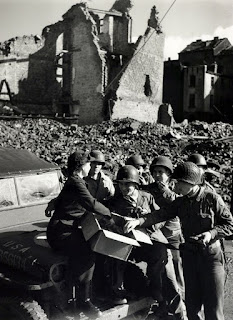In case you missed it -- this was a post from 2019 not long after I began posting here regularly. This seems an appropriate one for Memorial Day month too!
A "superhero" is a fictional character with extraordinary or superhuman powers or an exceptionally skilled or successful person.
Rather than paying tribute to the numerous actual people who populate my life and have exceptional or superhuman perseverance, strength, and empathy for others, I decided to write today about a group of women who straddle both worlds in a sense. The heroines of my Clubmobile Girls novels are fictional, yet they are rooted firmly in our documented history. Based on the thousands of women who answered the call to wartime service with the American Red Cross, my heroines have a strong sense of duty and patriotism, resilience, an adventurous and independent streak, and exceptional courage.Courage is the first word in the title of my first Clubmobile Girls novel, and it is the attribute my heroines call forth more than any other. As all good fictional characters do, my heroines must summon their mental strength to withstand and extricate themselves and others from dangerous situations. But my heroines evidence mettle from the beginning way before they are in any sort of perilous situation. Indeed, they have built up and drawn on an enormous reservoir of tenacity before my readers meet them. Of course, most American women served in some capacity during WWII, whether working in a factory or defense plant, enlisting in one of the auxiliary military service units, volunteering with the USO, the Red Cross, or a local hospital, or tending a victory garden and economizing in her household. But the women who secured the overseas assignments with the American Red Cross evinced particularly exceptional spirit and drive.
Well before the first women shipped out, before their overseas work was operational, the Red Cross intuited that the women who would organize and staff their clubs and mobile units all over the world must be self-starters with stamina, confidence, and adaptability. Most of the women who applied (only one in six would be successful) were poised, charming, and accomplished professionals who could draw on a varied life experience. They were good conversationalists who could hold their own in a male-dominated environment, who could laugh at a dirty joke but retain "girl next door" respectability, who could offer comfort and stability to both the homesick and shell-shocked soldiers. But it was her inner fortitude that likely won her the job, and it will be that same strength that will see her through it all.
Stand in her shoes and close your eyes. It's 1942, and you've just signed up for the duration. You don't know where you will be posted (a bomber base in southeast England or in the large cities of southeast Australia, a club in Algiers, Calcutta, or Chungking, a train serving men working in the deserts of Persia, a naval base in Iceland or Cuba) or what your day-to-day work will entail. You don't know when you might next see your parents or family and friends. Tied to that, of course, is the dawning realization that you don't know what the "duration" actually means. You have no crystal ball that shows a return to normalcy by 1946. You don't know how the war years will shape and change you profoundly forevermore, how those years more than any others will stand out as having been the most meaningful of your entire life. But you know one thing for certain: you wouldn't trade this opportunity to serve your country with courage for anything.
You can buy my books on Amazon, learn more about me and my writing on my website, or follow me on Facebook, Twitter, Pinterest, and Instagram.





1 comment:
Still one of my favorites of your monthly posts. Until I read your books and your blog posts here, I had no idea what the Clubmobile Girls went through to even become a Clubmobile Girl. Thank you for shining a light on them.
Post a Comment